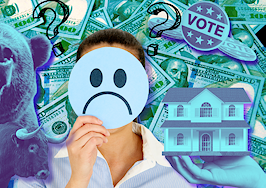The real estate industry is at a crossroads. A shocking report about racism within our industry has fallen on deaf ears among our leadership. Meanwhile, the Attorney General of New York State is now investigating the reports of discrimination by Realtors in Long Island exposed in Newsday.
The impact of the investigation on our industry will not just be isolated to New York, but will also ripple across the country. We’ve seen this before in other industries. Remember the good old days of taking Taxis before ride-share companies were everywhere?
In past years, studies on racism in the taxi industry confirmed what many black people already knew: They were being denied service based on their skin color.
This racist pattern and a more general discontent with taxis gave ride-share companies the edge needed to disrupt the whole taxi industry. The same pattern of denial through racist tactics is happening in our industry.
The question is: Are Realtors going the way of taxi drivers?
Let this be a wake-up call
In real estate, it can sometimes be harder to know (let alone prove) when discrimination has taken place. Now, the cat’s out of the bag. Newsday released the results of a three-year investigation a couple of weeks ago, proving rampant housing discrimination by Long Island Realtors.
Audio and video recording from three years of testing showed almost half of the Realtors treating black buyers and sellers differently than white peers. To be precise, according to Newsday’s findings, 49 percent of black clients, 39 percent of hispanic clients and 19 percent of Asian clients faced discrimination.
In many cases, there is outright video footage of Realtors being blatantly biased, including Coldwell Banker Residential Brokerage agent Rosemarie Marando, who when asked by a buyer about an area that is more diverse said “Follow the school bus, see the moms that are hanging out on the corners.”
The story is still developing, however, as much of the real estate industry’s response has been to deny that an issue exists. Despite clear evidence and sound methodology by Newsday’s testers, leadership in our industry is doubling down on denial. On Nov. 20, regular Inman columnist Jay Thompson summed it up nicely:
“Denial is a powerful thing. There is no doubt that some started reading this very column, and clicked away as soon as they realized I’m in agreement with the study’s findings. I do not doubt for a second that racism and discrimination are alive and well in our industry.
“Racism and discrimination that is certainly not limited to Long Island.
“If you don’t believe this investigation, if you don’t believe discrimination happens daily in your backyard, then you need to wake up and secure yourself a seat on the next train headed out of Fantasyland.”
Apparently, the real estate industry learned nothing from the taxi industry’s checkered history with racism. Realtor leadership cannot seem to produce even a talking point emphasizing that we must do more to ensure racial equity in our business, let alone offer plans, guidance or potential solutions.
Racism in real estate happens everywhere
Some in the real estate industry are dismissing this report as a Long Island situation, but it is not isolated. Housing discrimination occurs in every market, often in insidious and backhanded ways.
And it happens here in liberal Seattle.
I was recently touring with our team member Remington in Madrona, an area he tours all the time.
I’m white, and Remington is not. I walked out of one house first, and the agent holding the broker’s open turned to Remington and said, “Do you even have anyone who can afford to buy this house?”
I was appalled. Remington said, “It happens all the time and I just try to ignore it.”
Meanwhile one of Remington’s good friends lived down the street. If one of us were more likely to have a buyer for the house, it would have been Remington.
But these incidents aren’t limited to just agents being dismissive of our non-white team members.
We tour in our own neighborhood regularly. We walked into an open house one day, and a young agent was hosting the open.
When a random white buyer came into the home and asked why the home was priced so low the agent said, “Well, the home is ‘hood’-adjacent so … ” Yes, the agent was white. To this young man, my diverse community was a “hood” with “issues,” which is a not-so subtle way of saying, “Black and brown folks live here, so it may not be safe.”
These stories are not isolated events.
How often do we have to explain that our buyer with an Asian last name is not an investor from out of the country? Or listen to other agents openly steer folks into certain neighborhoods where they think they should live based on the color of their skin or economic status?
How often do neighbors start to call the police because they see an African American person showing a house? And the examples go on.
Why is the real estate industry not doing anything about the racism in our ecosystem?
Those who make and enforce the rules are the same people who are part of the problem.
On a thread in one of Jay Thompson’s Facebook posts, someone named Tony Arko, who, based on the Facebook profile attached to the commenter, appears to be the managing broker at United Real Estate and a former chair of the Dulles Area Association of Realtors in Virginia, showcased lots of bigoted opinions including discriminating against transgender people.

The one item that is especially disturbing is the note he made: “Newsflash, 99,9% of all people prefer their own race. Not discrimination, fact.” Hmm … is he saying that only white people should sell homes to other white people?
Let’s not mince words: It is illegal to discriminate against people in real estate because of their race — period. It’s been illegal at the federal level for 50 years now. But a bigoted Facebook post doesn’t prove that an individual actually kept someone from getting housing, and local Realtor associations will not enforce their own code of ethics unless you can prove that someone was denied housing.
Why won’t the industry change or address racism?
Marguerite Martin wrote a blog post on LinkedIn on this issue. “87% of real estate agents are white. 98% of the land in the United States is owned by white people.” Martin goes into detail about how the passive and overt systems we have constructed within this industry ensures that mainly white people are buying homes from other white people. White people benefit when we keep the current system moving forward. Hence there is no real pressure to change our practices.
Realtors risk being obsolete by not changing to address racism and discrimination in our industry
Uber became an existential threat to the taxi industry not because it had an app, but at least in part because there were well-known incidents of racism by the taxi industry. The “Hailing While Black” poll found that 62 percent of black Chicagoans and 55 percent of white Chicagoans believe minority communities are discriminated against by taxi service providers.
People living in urban areas (us included) flocked to Uber because we knew they would pick us up and take us where we needed to go. For years we never took a taxi because we lived in a more diverse neighborhood and knew they would not pick us up from our house. As soon as Uber came along, it all changed.
The real estate industry needs to take the Newsday article seriously, and it needs to do it now. The Attorney General of New York State is looking into the cases of discrimination on Long Island. The same Attorney General that has taken on Juul, WeWork’s President and the President of the United States. She takes on cases she knows she can win. Meanwhile the industry remains silent on this issue and hopes it will go away with the next news cycle.
Redfin is one of the few companies in real estate that has mandatory unconscious bias training: “All Redfin employees complete an unconscious bias training. This training identifies common biases and stereotypes that can influence hiring decisions and customer interactions and provides strategies to mitigate them.”
Whether we’re aware of it or not, we all have unconscious biases formed by our personal life experiences. While recognizing and talking about our biases can be uncomfortable, this dialogue is critical for creating an open culture where assumptions can be challenged.” Redfin understands that the next generation buyer and seller will not use a company with a known ethical issue.
Jay Thompson, Marguerite Martin and a few others are sounding the alarm because they love this industry and want us to do better. It’s hard to change an industry when the leadership is part of the problem. People of color need to have more than just “a seat” at the table, they need to be 50 percent or more of the table. For that to happen we all need to be leaders on this issue — now.
You need to become the leader to change racist practices in our industry
The Newsday article has been out for three weeks at this point. The way leadership is handling these clear incidents of racism is by pretending they don’t really exist. Or hiring “consultants” to craft a response.
Team Diva is licensed under a Coldwell Banker Affiliate in Seattle. Our company has barely noticed the Newsday article. In addition, we have reached out to two elected officials on our Seattle King County Association of Realtors board and no one seems to think it is an issue or an area where they need to provide guidance to the larger organization. Dale Chumbley, the president of our state association, did put out a notice to all Realtors in Washington. Unfortunately that notice did not make it down to the rank and file.
How to be a modern ethical agent in a time of denial
Clearly, change will not come from the top down in our industry. It is up to all of us to be individual leaders on this issue. Here are some simple steps to help you breakthrough the barriers that exist in all of our local markets.
1. Read White Fragility: Why It’s So Hard For White People To Talk About Racism
The bottom line is that white people stay within their white cultures, even if they are LGBTQ. Rarely do they go outside of their world to truly understand other people and their experiences. Hence the level of denial that we are seeing is a direct result of that hidden bias we all have for people that are not like us.
2. Understand unconscious bias
Everyone holds unconscious beliefs about various social and identity groups, and these biases stem from one’s tendency to organize other people into categories: She is Asian. He is white. They are poor. And it goes on. Most people are not inherently bad. But people do allow themselves to stay in their comfort zones, where they are free to discriminate without an awareness around that discrimination. And this is what needs to change. And it needs to change now.
3. Hire and support black and brown agents and managers in this industry
Only 4.4 percent of agents in this industry are African American. African Americans have endured the bulk of housing discrimination throughout history. As a result, they come with less family housing wealth than other communities. Traditional “work your sphere” processes do not work for communities where they are the first person to graduate college in their family. Getting started in real estate is expensive, and it is important to understand not everyone is on an even playing field.
4. Lean in on conversations of stereotyping and unconscious bias in your office
Once again, white people segregate themselves into their own community. They go to school with mostly white people. They work with mostly white people. A lot of people do not have a real friend who is from a different class, culture or community then themselves. Hear something, say something. People are not going to change because we sit politely minding our own business.
5. Pressure our leadership to do a better job training agents
Millennials just became the largest generation. They make buying choices that feel ethical and fair. They will not work with people that do not share their value. We are at a risk of having disruptors like Redfin and Compass take over market share with this group of homebuyers and sellers because we as an industry are incapable of changing our attitudes around race and equity. Redfin cares about housing rights and equality. It has hired more people of color than any other organization. It is 100 percent committed. Coldwell Banker cannot even put up a Pride Flag in their marketing around LGBTQ Pride season.
6. Be a Rosemary Buerger and get on the board at your local association
As soon as the Newsday article came out, North Carolina real estate agent Rosemary Buerger worked with her local association to make sure it was a known issue and that they needed to do something. We need more leaders like Buerger who understands the big picture and is willing to make waves to save our industry.
7. Commit to helping 2-3 first generation homebuyers find their first homes
The only way we are going to move the tide and increase homeownership with diverse communities is by helping the first generation homebuyer get their first home. There are down payment assistance programs in many states including Washington state.
Working through these programs requires a very skilled agent who will take the time to manage the process. Commit yourself to helping someone in 2020 to have a home to pass down to their kids.
The real estate industry needs to make a commitment to be an ethical environment for all homebuyers and sellers, or they risk going the way of the taxi cab industry.
We can commit to change, or change will happen to us through lawsuits, disruption and distrust by millenials and Gen Z. And let’s be honest: Facebook was a big change for most Realtors.
Having some hard conversations with ourselves around unconscious bias and racism is going to be tougher.
Chavi M Hohm is the leader of Team Diva at Coldwell Banker Bain in Seattle. Connect with her on Instagram or Twitter.













